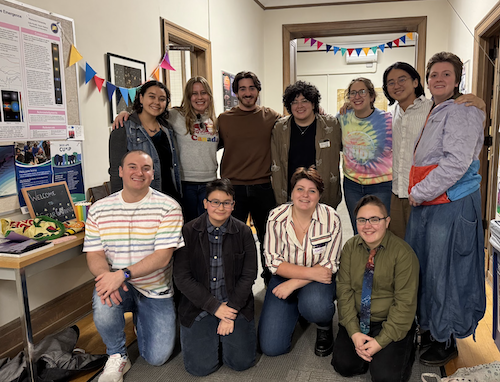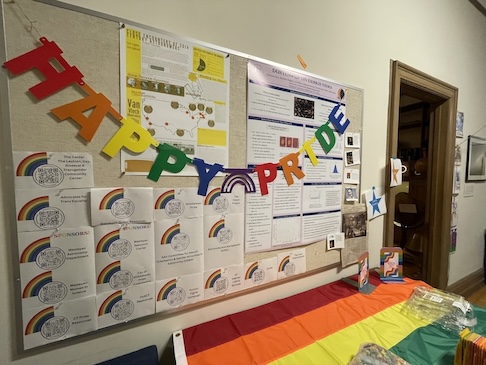
On Friday, Oct. 11, 2024, the Astronomy Department hosted its second annual Star GAY-zing public observing night as part of the University’s October Pride Month celebration, in collaboration with the Resource Center, the City of Middletown’s Pride Commission, and the Wesleyan Women in Science club. From 7 to 9 p.m., students, faculty, staff, and community members—some of whom drove hours from across Connecticut and Massachusetts—gathered at the Van Vleck Observatory to marvel at the cosmos together.
Katie Ciurleo MA ’25, one of the event’s core organizers, discussed the name Star GAY-zing and how the connection between queerness and space deserves attention.
“I think that there are queer people in every single space in the world, and making sure that that is recognized and celebrated is a wonderful thing,” Ciurleo said. “And queer people, especially—at least, of the astronomers that I know—have often turned to space, to science fiction as escapes from real world problems. And I think finding a way to connect all these people who are all feeling the same thing and super excited about space in general is just a lovely, lovely way to do that—and a lovely way to connect people from Wesleyan with the greater Middletown community.”
The department’s postdoctoral researcher Brianna Zawadzki, who helped organize the event both years, concurred.
“I think this department has worked really hard to be an inclusive place, and it has been from what I’ve seen,” Zawadzki said. “So I think in some ways, [it’s] our responsibility to have this sort of thing—share science with people and celebrate different identities…. I was just happy to be part of it again, because I think it’s just a really cool event [that] gets people excited about pride and gets people excited about space.”
This year’s Star GAY-zing event featured 8-inch, 20-inch, and 24-inch telescope viewings available all night, two laser pointer outdoor star shows, mini talks about queer topics in astronomy, a craft workshop where participants made plasticine planets using colors from various LGBTQ flags, and a planetarium show about queer myths and how they relate to the constellations. Treats and a zine recommending queer science fiction works were also placed around the Van Vleck Observatory.
Elias Mansell ’24 MA ’25, combined his background in classics and pursuits in astronomy as the host of a planetarium show, highlighting queer myths seen in the constellations—such as Zeus and Ganymede—as well as those that aren’t, including the story of Caeneus, a woman who was transformed into a man by Poseidon.
“The shape of [the constellation] Aquila…is an eagle,” Mansell explained during the show. “So the story with Aquila is that when Zeus was looking down from Mount Olympus one day, he spotted this Trojan youth named Ganymede. He decided that this was a really hot guy. So like any sane person would do, he turned into an eagle, swooped down, snatched him up, brought him to Mount Olympus, and made him into his cupbearer—which is a really horrible way to ask someone out on a date.”
According to Administrative Assistant Stef Dinneen, who helped coordinate the event, Star GAY-zing was first conceived of by Rewa Bush MA ’24 as a way to invite people from all identities to engage with astronomy.
“[Bush] had this vision of just making sure that people on campus in the Middletown community felt that this was a safe and inclusive space,” Dinneen said. “We had to stop offering a lot of public observing during COVID-19—we shut down completely for a while, and then it was just the Wesleyan community…. So this was one of our ways of welcoming everybody and trying to talk science in a way that was fun and inclusive for people who might not always feel included in the STEM community.”
The event organizers expressed gratitude for the generous support from the Middletown Pride Commission that made the event possible.
“Because department budgets are so small, we had to get creative, and we looked within Wesleyan…but we weren’t going to have enough,” Dinneen said. “I had been part of the Middletown Pride in the parade [in 2023]. And I said, why don’t we try and speak with Christopher Forte, who—at the time—was one of the commissioners on Middletown Pride, and see if there’s any funding available. And he was like, totally on board…and they were very generous in supporting us, and it was good because we were unable to secure any funding within Wesleyan, besides [from] the Astronomy Department, this year.”
Dinneen added that the collaboration with Middletown Pride allowed the department to publicize the event effectively within a short time frame.
“Middletown Pride does a great job of publicizing the events, and they have an awesome following of people on social media,” Dinneen said. “Even though we were on a shorter timeline, we got the word out more.”
The response from the community was overwhelmingly positive. The event gathered attention beyond Middletown and attendees from nearby towns also flocked to the observatory.
“I was outside running some demonstrations about spectra—looking at light broken up into rainbow components,” Ciurleo said. “It’s been so cool to see people I talked to last year drive multiple hours to get here. That kind of energy is so wonderful. And it was so cool to see people that I’ve never seen before in the observatory, compared to the same people coming to the same events over and over again.”
Zawadzki agreed.

“I think the turnout was really good, and people seemed just really excited to be here,” Zawadzki said. “I think astronomy, in some ways, is the more approachable science for a lot of people, because everybody thinks space is cool and you don’t necessarily need to get into all the physics and math behind it, so it’s easy to bring people in and get them excited.”
Among the attendees were local residents River and Xeno Dell, who drove for over an hour from Brooklyn, Conn. to take part in the event.
“We went to a transgender gaming night, and they mentioned this as one of the events coming up,” Xeno Dell said. “[It was] amazing and a lot of fun. I really enjoyed the seminar about light pollution. I thought that was really fascinating…. I’m really into sci-fi, and I’m really into queer sci-fi too. I have plans to write a book, so I want to go to more stuff like this and talk to queer people about what they know about actual science.”
River Dell echoed their spouse’s enthusiasm.
“I like looking at Saturn through the telescope—that was beautiful,” River said. “I feel like there’s so much queer stuff, not just like in science, but in science fiction especially. Looking forward to next year!”
Looking back, the organizers felt like the event was a success.
“I think everybody’s had a great time,” Dinneen said. “I think the weather really cooperated, so we were able to get the telescopes up and running and have the outside demos. [Zawadzki] is down here doing the Pride Planets. This year, I saw a lot of new faces that I didn’t remember from last year. [Associate Professor of the Practice in Astronomy] Roy [Kilgard], one of our faculty members, is here tonight and saying that he has seen people from Wesleyan—faculty and staff—here tonight for the first time in the years that he’s been here.”
Dinneen expressed hopes for future iterations of the event, aiming to host more in both the fall and spring semesters, provided the department secures the necessary funding.
“Well, we hope to be back next year,” Dinneen said. “We’ll have to recruit some new students, because we’re going to lose a bunch of them to graduation, but we have a few that will still be here who can help us recruit more people. I don’t know if people write to The Argus, but if there’s ever anything that people want to see, we are open to collaborating and changing it up a little bit.”
Elias Mansell is an Executive Editor for The Argus.
Sida Chu can be reached at schu@wesleyan.edu.



Leave a Reply